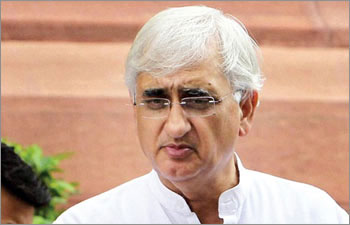NEW DELHI, September 27: India made the first public condemnation of a U.S. electronic interception programmes during meetings with its non-traditional allies on the sidelines of the ongoing United Nations General Assembly in New York.
It also called for resuscitating the process of reforming the United Nations Security Council (UNSC) and stopping the external supply of arms to “all” sides in Syria.
Along with Brazil and South Africa which form the IBSA grouping, Foreign Minister Salman Khurshid joined his colleagues in pointing out that the unauthorised practice of illegal interception of communications and data was a “serious violation of national sovereignty and individual rights”, and incompatible with “democratic coexistence between friendly countries”.
The three countries called for an open discussion and setting of international norms. The Indian official response has been cautious though Brazil took serious umbrage following reports of its Presidential Office having been tapped by the U.S. National Security Agency (NSA). Brazilian President Dilma Rousseff cancelled her visit to meet U.S. President Barack Obama.
The Hindu recently reported that the NSA did not lag behind in electronic surveillance of the Indian communications system. Billions of pieces of information were extracted in just 30 days from Indian telephone and internet networks.
Opening in resolving Syrian conflict
IBSA Foreign Ministers, including the new Brazilian incumbent Luiz Alberto Figueiredo Machado, saw an opening in resolving the Syrian conflict after its President Bashar al-Assad agree to abide by the Chemical Weapons Convention. They insisted on an immediate stop to the external supply of weapons to all sides and wanted the United Nations to quickly convene a second international conference on Syria to consider implementing the final Communiqué of an earlier international meet (Geneva-I).
On the question of reforming the United Nations Security Council, Mr. Khurshid also met his counterparts from Germany, Japan, Brazil, called G-4 – one of the five groups engaged actively in discussions on the issue.
They were meeting a couple of months after President of the General Assembly Vuk Jeremic summarised the ninth round of discussions as having “clearly exposed the divergence of views” and felt there was a “deadlock in terms of what should be the specific way ahead”. The IBSA Foreign Ministers also supported each other’s candidatures as permanent members of a reformed UNSC.
Days before, India’s Permanent Representative to the UN Asoke Mukerji had said frustration was building up among the international community over the UNSC’s inability to respond to global crises due to lack of reforms in its structure and functioning.
Ministers back Zahir Tinan
Joint statements by Foreign Ministers of both groups made this point, and also backed the Afghan diplomat and Chairman of the intergovernmental negotiations Zahir Tanin who has been re-appointed to the post. Mr. Tanin’s urging for a short negotiating document has been resented by some countries, but the G-4 communique said he had played an important role in negotiations. Mr. Tanin was absent from the meeting in which Mr. Jeremic painted a pessimistic picture about UNSC reforms.

